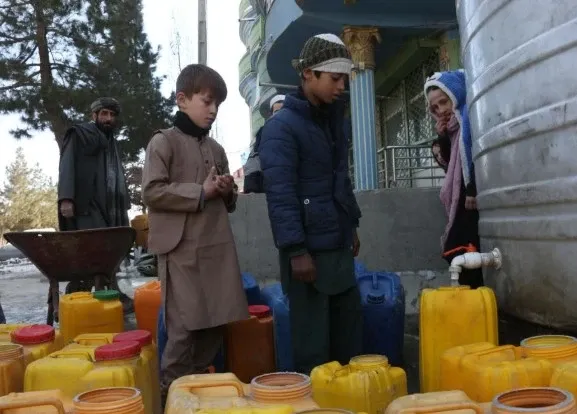Is Kabul Facing an Unprecedented Water Crisis?

Synopsis
Key Takeaways
- Kabul is experiencing a severe water crisis impacting millions.
- Residents are pleading for government intervention.
- The UN has labeled the situation as unprecedented.
- Drastic declines in groundwater levels threaten future water availability.
- Immediate investments in water infrastructure are crucial.
Kabul, July 19 (NationPress) The capital of Afghanistan, Kabul, is currently experiencing an unprecedented water crisis, which is severely impacting millions of its residents, as reported by local media on Saturday.
Recent findings indicate a significant drop in water levels across central and western Kabul, according to a report from Afghan media outlet TOLO News.
“Water is essential for survival. Without it, daily life becomes incredibly challenging. If these petrol stations cease water distribution, people could perish from hunger and thirst,” expressed Mohammad Agha, a local inhabitant.
Another resident lamented, “Children and women roam the streets day and night with buckets in search of water, but it remains elusive.”
City dwellers have urgently called upon the Taliban-led interim government to alleviate their plight by enhancing the water supply infrastructure and drilling deeper wells.
On Thursday, the United Nations Human Settlement Programme (UN-Habitat) in Afghanistan characterized the water crisis as “unprecedented.”
The UN agency highlighted that the alarming decline in water levels in Kabul threatens nearly six million residents, putting them at severe risk of water scarcity.
“Addressing this crisis requires substantial investment, robust collaboration, and increased public awareness regarding water management. Water is life. We must act immediately,” the UN agency posted on social media.
A recent study by NGO Mercy Corps revealed that some households in Kabul allocate up to 30% of their income for water, with more than two-thirds accruing water-related debt.
“The extraction of groundwater far exceeds natural replenishment, and almost half of the city’s boreholes are already dry. Without urgent and coordinated investments, Kabul risks becoming the first modern capital to run out of water,” the report stated.
It was noted that up to 80% of groundwater is considered unsafe, containing high levels of sewage, arsenic, and salinity, presenting immediate public health hazards.
Earlier in March, UN-Habitat warned that 21 million individuals across the country require access to water, sanitation, and health support.
“Major cities such as Kandahar, Kabul, and Herat are grappling with water shortages due to the depletion of their groundwater resources. The UN has consistently highlighted this issue, indicating the critical need for large-scale investments,” asserted Stephanie Loose, head of UN-Habitat in Afghanistan, emphasizing the necessity for significant advancements in water infrastructure.










